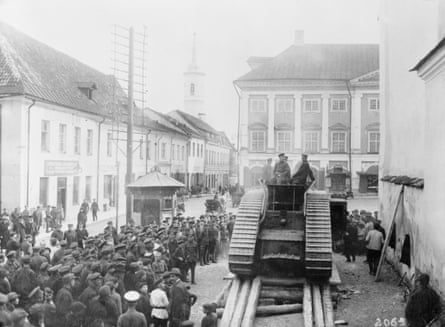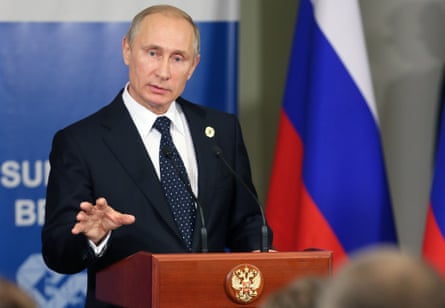A LIFE IN WRITING
Sofi Oksanen: ‘We know about British colonialism. Russian colonialism is not well known’
For a Finnish writer to be translated into English is an unusual event; over the last decade, only 40 or 50 Finnish novels have appeared in the US and UK – a “strange” state of affairs, according to Sofi Oksanen. But Oksanen isn’t merely a Finnish writer who has broken through. The author of Purge (2008), which sold over a million copies, is an international publishing sensation, frequently likened to Stieg Larsson. Only one Finnish author outsells her, Oksanen jokes: the late Tove Jansson, creator of the lovable, bohemian Moomin family.
She’s also won more awards than any other contemporary Finnish author. Her fiction has scooped the European book prize, the prestigious Swedish Academy Nordic prize and the French Prix Femina. When her fourth novel, When the Doves Disappeared, came out in Finland and Sweden in 2012, it shot straight to No 1; it will be published in 29 countries around the world, including the UK next month.
Like Purge, its theme is the occupation of Estonia – Oksanen has a Finnish father and an Estonian mother – during and after the second world war. The novel’s title refers to German soldiers who snared and ate pigeons in the Estonian capital, Tallinn, during wartime, and to the divergent twin fates of collaborators and resisters. (The country was occupied by the Soviet Red Army, then the Nazis, then the USSR again.)
Some have described Oksanen’s work, with its episodes of murder, sexual violence and family betrayal, as classic crime writing. But when I meet her in London – soon after the Kremlin critic Boris Nemtsov is shot dead on the streets of Moscow – she identifies herself as a “post-colonial author”. “We know about British colonialism. Russian colonialism is not so well known,” she explains. “I think we should call it what it was – and is.”
Russia has never been “an overseas kind of empire”, she adds, rather a state that’s sought to exploit and colonise its European neighbours. Oksanen says that, growing up in Finland, she learned about the country’s past at school. But she was taught nothing of Estonia and had to fill in the gaps from oral history. Her mother’s family has lived in western Estonia, near Haapsalu, since the 15th century; she emigrated to Finland in the 70s, and when Sofi was a child, she would travel to Soviet Estonia to see her grandparents.
Her family reflects Estonia’s 20th‑century divisions, she says. Her grandfather joined the Forest Brothers, a partisan group that fought against Soviet rule during and after the war. He accepted amnesty following Stalin’s death. “He was always reminded of his past. He became a very silent man,” Oksanen says. One of her grandfather’s brothers was deported to Siberia. Another carried out the deportations. He was subsequently hailed as a communist war hero.
“It’s a typical Estonian story. The Baltics were doubly occupied, so these stories were common. There were victims of the terror sitting around the same table with people who had been tools of that terror.” Oksanen says ethnic Russians who resettled in Estonia after 1945 had no idea they were living in a once-sovereign country. Estonia had vanished. Of her collaborating great-uncle, she says: “He wasn’t a nice person.”
When the Doves Disappeared maps out these bitter intra-family conflicts. It features two cousins. One, Roland, is an Estonian freedom fighter; the other, Edgar, becomes an enthusiastic servant of the Nazis. The story flips between 1941-44 and 1963-66. During the Soviet years, Edgar reinvents himself as a loyal communist. He is a secret policeman. Ambitious, and keen for a posting to the GDR, he writes an official Soviet history of the wartime “Hitlerist” occupation.

The novel features a German concentration camp and the persecution of Jews. I suggest to Oksanen, though, that the German officers – with their superior manners, ingenious pigeon snares and imported bathtubs – emerge in a better light than their Russian counterparts. Edgar’s frustrated wife, Juudit, has an affair with an SS-Hauptsturmführer; the theme of sexual rivalry echoes Purge, where two sisters fall in love with the same man, with terrible consequences.
“The Germans killed fewer Estonians. Less casualties. It’s as simple as that,” Oksanen says. “The German occupation lasted three years; the Soviet occupation half a century.” Oksanen points out that when she was growing up, the Soviet deportations of 1941 and 1949 – which saw thousands of “subversives”, including the country’s prewar leadership, sent to Siberia – weren’t mentioned. The euphemism for deportation was “people who were taken”. Or “sent to a cold country”.
Edgar carries out surveillance for the Soviets on a Tallinn cafe frequented by arts students with Estonian nationalist leanings. These scenes are pregnant with a spooky low-level menace. A real-life Estonian, Edgar Meos, provided a role model for Edgar. Meos was a prolific author of Soviet propaganda, much of it distributed in East Germany. He built his career on an elaborate fraud: he pretended to be a former pilot and an expert in Soviet aviation. He forged documents, even a flying licence, and claimed he’d trained with the RAF. “He was such a wonderful liar,” Oksanen says. The Forest Brothers dwindled, were captured or gave up. Meos died happily in his bed.
Born in 1977, Oksanen grew up in central Finland. Her mother, an engineer, lived in Soviet Estonia and fell in love with a Finn. Much of this backstory finds its way into 2003’s Stalin’s Cows, Oksanen’s debut novel, which explores mother-daughter relations, the female body, eating disorders and the 1970s, when Estonians were able to watch Finnish television for the first time. It is a remarkable book, which has yet to find an English translation. (I read it in German.) Oksanen is bisexual and has herself suffered in the past from eating disorders. Like her first work, her second novel, Baby Jane, which appeared in 2005, includes autobiographical elements. One of its themes is violent lesbian relationships.
Oksanen says she has a “perfect memory” of trips in the 80s to visit her Estonian relatives. An aunt had to invite them so they could obtain a Soviet visa, which wasn’t always granted, and which only allowed them to travel to Tallinn. In secret they drove out to the countryside, where her grandparents lived on a kolkhoz, a collective farm. Her fiction offers a warm portrait of Estonian rural life: a world of pancakes, sugar beet soup and jam-making.
Oksanen studied literature and then drama at the Finnish theatre academy in Helsinki. She says she didn’t originally intend to write about Estonia’s recent past. “It just came,” she says. Purge began as an acclaimed stage play. The novel was a critical and commercial hit in Finland: it sold 260,000 copies in a country of fewer than 5.5 million people, and won the Finlandia prize, the country’s top literary award.
She began writing When the Doves Disappeared in 2007. President Putin had declared Estonia an enemy state. Suspected Kremlin hackers had launched a major cyber-attack on Estonia, the first of its kind, in the wake of a government decision to relocate a monument to Red Army soldiers. This multi-faceted attack by the Russian Federation included a return to Soviet-era propaganda: the Estonians, Putin declared, were Nazis and fascists.

Oksanen says that Estonians instinctively understood this communist-style rhetoric. In Soviet times “fascist” meant anyone outside Russia, or against Russia. But the Finns, she believes, had lost their ability “to read Russian propaganda”. Researching an article, Oksanen discovered that many of those who wrote postwar Soviet propaganda had started off writing it for the Nazis. “That’s when I decided my angle was the German occupation,” she says.
In Finland and Estonia, Oksanen is a household name and frequent TV guest. She has used her literary celebrity to decry Finlandisation – Finland’s traditional foreign policy that favoured the Soviet Union. Giving the opening address at last year’s Frankfurt book fair, she called this the “diminishment of independence and the strangling of freedom of speech”. The maps used in Finnish schools “did not include my other homeland, Estonia”, she pointed out.
Oksanen was a notable critic of Putin’s before Russia’s covert invasion of Ukraine in 2014. She finds it strange that some EU leaders have suggested Ukraine follow the Finlandisation model in order to appease Russia’s president. “I wish that the Russian people would have a chance to live for 10 years in a world with freedom of speech and the press,” she says. “If they did I don’t think they’d go back.” She argues that “it isn’t our job to change Russia” – that’s down to the Russians. In the meantime, though, we should keep out “Putin’s poodles and puppets”.
Russians don’t exactly emerge well from Purge. The plot includes two vicious sex traffickers from Vladivostok, who rape, abuse and hunt their female victim. Rights were sold in Russia, but the publishing house in Moscow added its own unauthorised foreword saying Oksanen had portrayed Russians as “pigs and murderers”. In 2010, she edited a series of essays on Estonian history; pro-Putin youth groups protested at the launch event. Sometimes Kremlin trolls abuse her on Twitter. “I block them,” she says.
Oksanen cites as her literary influences Kazuo Ishiguro – “he writes perfect novels” – and Alexander Solzhenitsyn, whom she read as a teen. The Gulag Archipelago was a refreshing piece of truth-telling, she says, like “cleaning the dirt from the screen”.
What of the comparisons with Larsson? There are superficial shared themes, such as the violent exploitation of women. However, Lola Rogers, Oksanen’s Seattle-based English translator, says Larson’s Millennium trilogy and Purge“seem very different books to me”. Rogers calls Oksanen a writer of “serious historical fiction” engaged with a “very particular period in recent history”. Oksanen’s success, she adds, has kickstarted growing interest in Finnish literature, which bodes well for future translations.
Oksanen, meanwhile, is bitterly critical of the Helsinki book fair, which has accepted the Russian embassy as this year’s sponsor. She calls the decision “idiotic”. Oksanen last visited Moscow in 2010. With Europe’s border being chewed up by force, and Russian tanks once more on the move, she says she has no plans to go back. “I don’t want to spend a single rouble there,” she says.
When the Doves Disappeared is published by Atlantic.


No comments:
Post a Comment